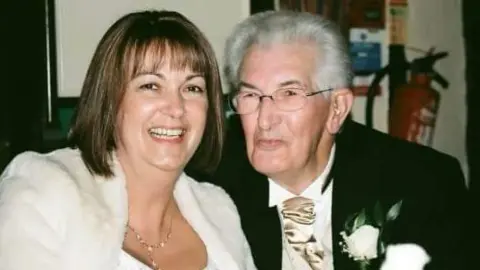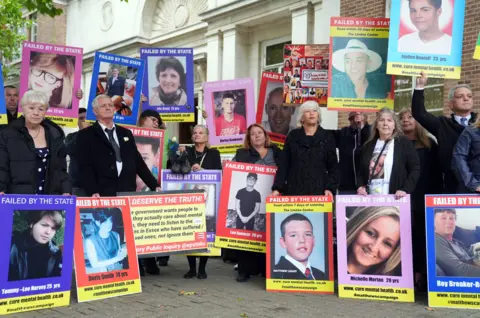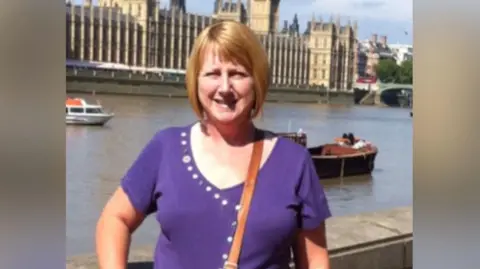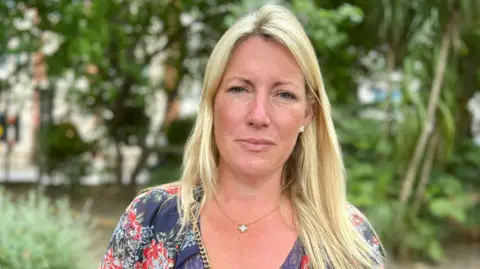Lampard Inquiry evidence shows 'lack of humanity'
 FAMILY HANDOUT
FAMILY HANDOUTThe counsel to an inquiry looking into deaths in mental health inpatient units said evidence from bereaved relatives reflected "a lack of empathy and humanity" in mental healthcare.
The Lampard Inquiry is the first to investigate the deaths of more than 2000 people on mental health wards between 2000 and the end of 2023.
In a statement that closed the latest round of hearings, Nicholas Griffin KC described how one patient, Geoff Toms, 88, was placed in nappies, even though he could use the toilet, and how some hospitals felt more like prisons.
One of the main trusts responsible for mental healthcare, the Essex Partnership University NHS Foundation Trust (EPUT) has apologised to those failed.
 PA
PAMr Griffin paid tribute to relatives who had shared their personal experiences saying they had acted with "confidence, courage and expressions of love".
Lynda Costerd, the daughter of Geoff Toms, was one of those giving evidence. She described her father's experience on Beech Ward at Rochford Hospital, an older person's mental health unit.
He died in May 2015 and she says he was on the ward for less than 6 days, when he suffered injuries.
"He was basically put in a chair, and they would take his walker away from him, so that he couldn't get up and move, so much so, they put him in nappies... even though he wasn't incontinent," she said.
Ms Costerd believed he was becoming malnourished, and said he was so thin that "you could see his pacemaker".
She explained how Mr Toms had broken his nose during falls on the ward.
She also said he had two black eyes and bruising to his face and looked like "he had been mugged".
Ms Costerd said her mother told medical staff Mr Toms needed to see a doctor.
But she said they replied: "It doesn't work like that. You can't just say you want a doctor."
'Dire circumstances'
The inquiry also heard how Pippa Whiteward, the mother of a baby, was restrained and handcuffed to a bed by police when - while in crisis - she attended the accident and emergency department at Broomfield Hospital in Chelmsford.
Her sister Lydia Fraser-Ward described how Ms Whiteward's husband had called it an "NHS version of a prison cell".
She said her sister had been transported to Staffordshire as it was the only mother and baby unit bed available in the whole country.
She told the inquiry: "If there are really that few beds in this country for mothers with young babies who are having a mental health crisis that they have to ferry them around in ambulances, hundreds and hundreds of miles, just to give them a bed, then we are in really dire circumstances, aren't we?"
Ms Whiteward, aged 36, took her life in October 2016 after being discharged.
 Family handout
Family handoutAnother relative who gave evidence was Emma Cracknell, who spoke about her mother Susan Spring, who patrolled the streets of London as a Met police officer.
She described how Ms Spring had not suffered from mental health problems in the past and how, when she tried to take her life, she was not assessed by a psychiatrist or sectioned to a mental health inpatient bed.
After giving evidence, Ms Cracknell told the BBC: "I know she would have wanted to have her voice heard. I know the care she was given was not adequate.
"When you lean on a service like the crisis team, you just pin all your hopes on the fact they know what they're doing," she said.
But she added they knew they were not alone, and she hoped the inquiry could "bring around change".
 NIKKI FOX/BBC
NIKKI FOX/BBCMr Griffin said inquiry chair Baroness Lampard's team remained "disappointed" with the number of staff volunteering evidence, adding they were "few in number".
It could be 2026 before staff are called to testify. Relatives of patients will continue to give evidence in October.
Mr Griffin said mental health did not receive the attention it merited, given one in four adults and one in 10 children experience mental illness.
"Chair, I know it is your hope that the Lampard Inquiry contributes to a wider conversation, that the public will engage in this, and that the media will reflect these experiences," he said.
EPUT chief executive Paul Scott has apologised for deaths under his trust's care.
He said: "As the inquiry progresses, there will be many accounts of people who were much loved and missed over the past 24 years and I want to say how sorry I am for their loss."
Baroness Lampard is expected to produce a final report in 2027.
Follow Essex news on BBC Sounds, Facebook, Instagram and X.
